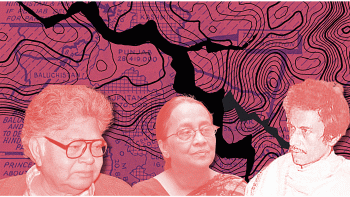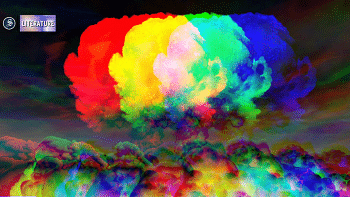Kazi Nazrul Islam’s short narratives
Kazi Nazrul Islam (1899-1976), was a poet, novelist, lyricist and musician in Bengali, and was popularly known as the rebel poet.
Unravelling Bangali feminism and female rage
Feminism and literature share a profound connection as literature gives voice to the experiences of women, allowing us to understand their perspective. However, despite the abundance of information in the technological age, the promotion of feminist books remains a challenge in Bangladesh, often facing criticism from conservatives.
Anjuman and the stories of the mango people
My father’s ancestors were Ayurvedic medicine men from a remote corner of the North Bengal. A few generations ago, one of them had cured a long-lasting ailment of the Raja of Taherpur and had received, as a reward, a large chunk of agricultural land or “joat” next to the mighty Joshoi Beel.
The poet who shook the Ershad regime
As he had actively protested against Ayub's dictatorship, and was indeed jailed, he felt compelled to protest against Ershad's dictatorship through his poetry.
Ameena goes to America
A young white officer asks her in heavily accented Bangla, “What’s the purpose of your visit?”
Partition and Bangladeshi literature
Their apartment was located on the ground floor of a three-storied building whose yellowish paint looked as if it was peeling off on its own.
‘Bare life’ and Partition
“Can one break a country...Will the earth bleed?” asks eight-year-old Lenny in Bapsi Sidhwa’s Cracking India (1988)–a tale about Partition. “No one’s going to break India. It’s not made of glass!”
7 minutes to midnight
In exchange for the presidential suites at the Ritz and so on, the men holding our city keys have already opened our skies to all that may come.
Crooked lines
To sit on thy laurels seems apposite, Yet to dig graves for perceptive pleasure resemble a breach Of lines bridging the things learned, unlearned.
Rabindranath Tagore’s ‘Gora’: From notions of purity to an all-embracing Bharatborsho
Rabindranath Tagore’s Gora, written between 1907 and 1909, reveals the ways in which Tagore addresses the all-important issues of his time—national identity formation, the coming together of people over time, and obstacles or barriers put in the way of the progress of a nation. The novel captures Tagore’s fascination with envisioning a future based on human amity or moitri, one where the powerless and the dispossessed transcend the barriers of division and distrust.





















